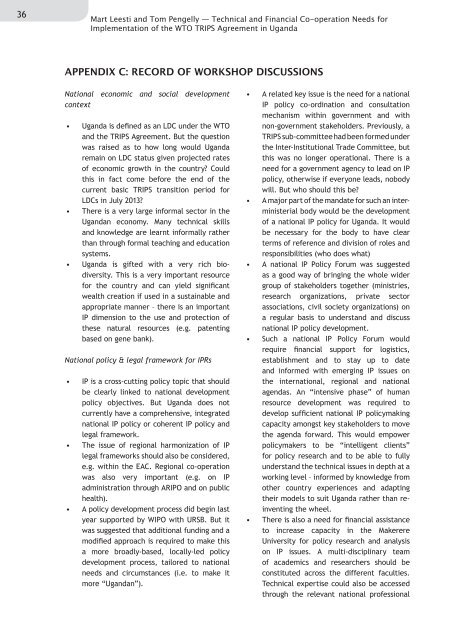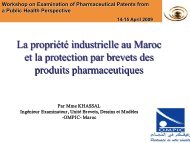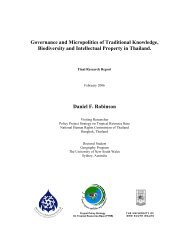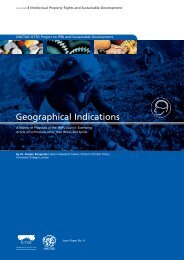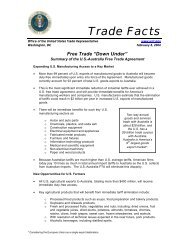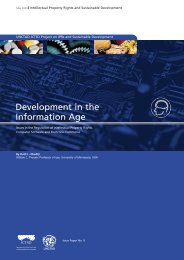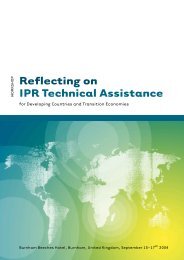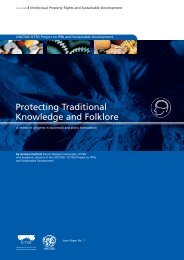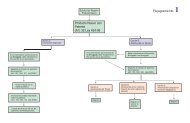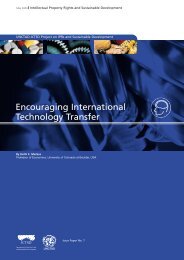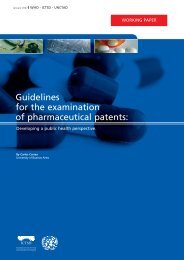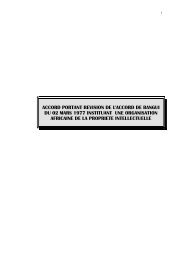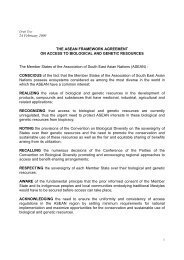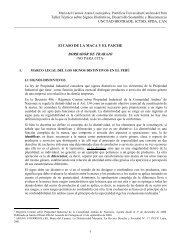Final Report of Uganda Intellectual Property ... - IPRsonline.org
Final Report of Uganda Intellectual Property ... - IPRsonline.org
Final Report of Uganda Intellectual Property ... - IPRsonline.org
Create successful ePaper yourself
Turn your PDF publications into a flip-book with our unique Google optimized e-Paper software.
36<br />
Mart Leesti and Tom Pengelly ― Technical and Financial Co-operation Needs for<br />
Implementation <strong>of</strong> the WTO TRIPS Agreement in <strong>Uganda</strong><br />
APPENDIX C: RECORD OF WORKSHOP DISCUSSIONS<br />
National economic and social development<br />
context<br />
• <strong>Uganda</strong> is defined as an LDC under the WTO<br />
and the TRIPS Agreement. But the question<br />
was raised as to how long would <strong>Uganda</strong><br />
remain on LDC status given projected rates<br />
<strong>of</strong> economic growth in the country? Could<br />
this in fact come before the end <strong>of</strong> the<br />
current basic TRIPS transition period for<br />
LDCs in July 2013?<br />
• There is a very large informal sector in the<br />
<strong>Uganda</strong>n economy. Many technical skills<br />
and knowledge are learnt informally rather<br />
than through formal teaching and education<br />
systems.<br />
• <strong>Uganda</strong> is gifted with a very rich biodiversity.<br />
This is a very important resource<br />
for the country and can yield significant<br />
wealth creation if used in a sustainable and<br />
appropriate manner – there is an important<br />
IP dimension to the use and protection <strong>of</strong><br />
these natural resources (e.g. patenting<br />
based on gene bank).<br />
National policy & legal framework for IPRs<br />
• IP is a cross-cutting policy topic that should<br />
be clearly linked to national development<br />
policy objectives. But <strong>Uganda</strong> does not<br />
currently have a comprehensive, integrated<br />
national IP policy or coherent IP policy and<br />
legal framework.<br />
• The issue <strong>of</strong> regional harmonization <strong>of</strong> IP<br />
legal frameworks should also be considered,<br />
e.g. within the EAC. Regional co-operation<br />
was also very important (e.g. on IP<br />
administration through ARIPO and on public<br />
health).<br />
• A policy development process did begin last<br />
year supported by WIPO with URSB. But it<br />
was suggested that additional funding and a<br />
modified approach is required to make this<br />
a more broadly-based, locally-led policy<br />
development process, tailored to national<br />
needs and circumstances (i.e. to make it<br />
more “<strong>Uganda</strong>n”).<br />
• A related key issue is the need for a national<br />
IP policy co-ordination and consultation<br />
mechanism within government and with<br />
non-government stakeholders. Previously, a<br />
TRIPS sub-committee had been formed under<br />
the Inter-Institutional Trade Committee, but<br />
this was no longer operational. There is a<br />
need for a government agency to lead on IP<br />
policy, otherwise if everyone leads, nobody<br />
will. But who should this be?<br />
• A major part <strong>of</strong> the mandate for such an interministerial<br />
body would be the development<br />
<strong>of</strong> a national IP policy for <strong>Uganda</strong>. It would<br />
be necessary for the body to have clear<br />
terms <strong>of</strong> reference and division <strong>of</strong> roles and<br />
responsibilities (who does what)<br />
• A national IP Policy Forum was suggested<br />
as a good way <strong>of</strong> bringing the whole wider<br />
group <strong>of</strong> stakeholders together (ministries,<br />
research <strong>org</strong>anizations, private sector<br />
associations, civil society <strong>org</strong>anizations) on<br />
a regular basis to understand and discuss<br />
national IP policy development.<br />
• Such a national IP Policy Forum would<br />
require financial support for logistics,<br />
establishment and to stay up to date<br />
and informed with emerging IP issues on<br />
the international, regional and national<br />
agendas. An “intensive phase” <strong>of</strong> human<br />
resource development was required to<br />
develop sufficient national IP policymaking<br />
capacity amongst key stakeholders to move<br />
the agenda forward. This would empower<br />
policymakers to be “intelligent clients”<br />
for policy research and to be able to fully<br />
understand the technical issues in depth at a<br />
working level – informed by knowledge from<br />
other country experiences and adapting<br />
their models to suit <strong>Uganda</strong> rather than reinventing<br />
the wheel.<br />
• There is also a need for financial assistance<br />
to increase capacity in the Makerere<br />
University for policy research and analysis<br />
on IP issues. A multi-disciplinary team<br />
<strong>of</strong> academics and researchers should be<br />
constituted across the different faculties.<br />
Technical expertise could also be accessed<br />
through the relevant national pr<strong>of</strong>essional


